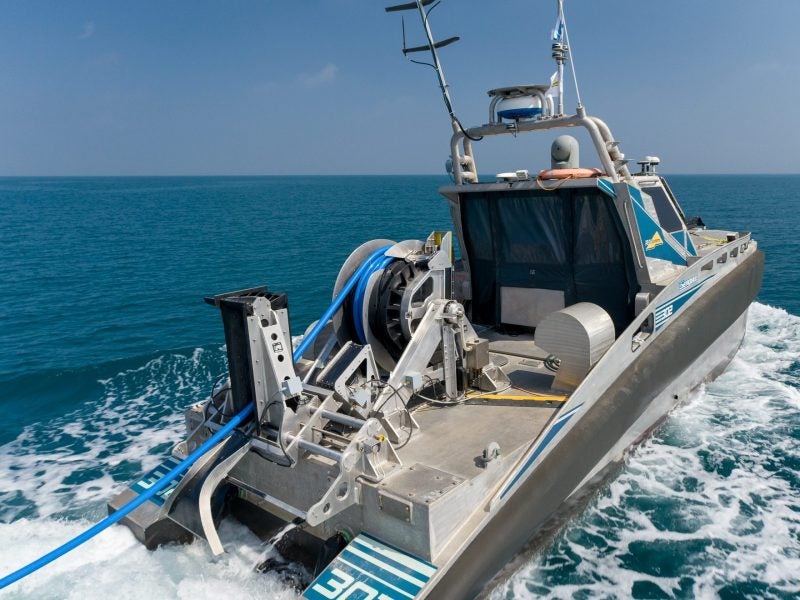
In early June, Elbit Systems UK revealed its Seagull USV had completed several trials with Dstl under the framework, since then Dstl gave Naval Technology the inside track on the progress of Progeny.
The trials, which took place last October, saw the Seagull USV operating off the coast of the UK, demonstrating the autonomous ASW capabilities of the vessel. Elbit is one of several contractors funded under the Progeny framework, which is worth £200m over 8 years.

Discover B2B Marketing That Performs
Combine business intelligence and editorial excellence to reach engaged professionals across 36 leading media platforms.
Commenting on the aims of the research and framework, Dstl autonomous systems senior principal scientist Phil Brown told Naval Technology: “Dstl is investigating the use of maritime autonomous systems (MAS) to support anti-submarine warfare (ASW) by assessing the state of the art of MAS capability in providing scalable effective ASW as part of the force mix.”
ASW operations have joined minehunting as a specific area of interest for the recent a flurry of development and interest in USVs, as both are generally seen as dull, dirty or dangerous. In the past, Elbit’s Seagull USV has participated in several Mine Countermeasure (MCM) trials. The USV has also participated in NATO joint-ASW exercises in 2018.
Commenting on the scope of Dstl’s autonomous ASW experimentation, Brown explained: “The experimentation involves at-sea testing of several differing MAS based ASW systems under controlled conditions; investigating many aspects of ASW MAS performance including launch and recovery, command and control, seakeeping, autonomy and sensor capability, to understand the readiness of currently on-offer and near-term solutions to be used operationally by the Royal Navy (RN).”
A key aspect of Progeny is the collaborative stakeholder framework it creates between industry and Dstl in its mission to evidence the utility of autonomous systems and underpin transformation within the Royal Navy. Brown said that activity under the Progeny Framework is ‘fully aligned’ with the Royal Navy’s own Autonomous Systems Campaign Plan.

US Tariffs are shifting - will you react or anticipate?
Don’t let policy changes catch you off guard. Stay proactive with real-time data and expert analysis.
By GlobalDataIn the past, Dstl and the Royal Navy have successfully shown how MCM operations can be undertaken by USVs and autonomous systems, now the next challenge is to prove the same in the Submarine warfare space.
Brown said: “Building on the successful application of unmanned surface vehicles for mine countermeasures (MCM) within the RN, ASW is a challenging next step.
“In addition to helping shape the response by Maritime Capability in Navy Command Headquarters to this challenge, the work is providing evidence to Defence Nuclear Organisation Submarine Capability to aid decision making on the potential for unmanned systems to provide part of the Maritime Underwater Future Capability.”
Under the Progeny Framework, several research areas are actively being explored including the above mentioned USVs, future submarine platforms and underwater networking and communications technologies.
Commenting on his company’s involvement in Progeny and the Seagull USV trials, Elbit Systems CEO Martin Fausset said: “Elbit Systems has world-leading technology to offer to the maritime and littoral environment. The Seagull USV has once again, demonstrated its superior capabilities underlining Elbit Systems UK’s competitive position to providing innovative and cost-effective solutions to the UK Armed Forces.
“We are proud of our ongoing work with the Royal Navy as we work together to maintain its operational advantage.”
Seagull USV
In the trials, Elbit used its Seagull USV, fitted with a sonar system developed by L3 Harris. The system described as a ‘multi-mission, multi-sensor’ vessel is fitted with what Elbit refer to as an ‘ASW Toolbox’ solution that was used to demonstrate the USVs abilities as an ASW force multiplier.
In a press release, Elbit said that “its Anti-Submarine Warfare (ASW) capability provides the navy with a tactical advantage by deterring and threatening enemy submarines using an available asset with significantly lower risk.
“Seagull’s Mine Counter Measures (MCM) capability facilitates end-to-end mine hunting operations including detection, classification, localisation, identification and neutralisation of bottom, moored and drifting sea mines.”





